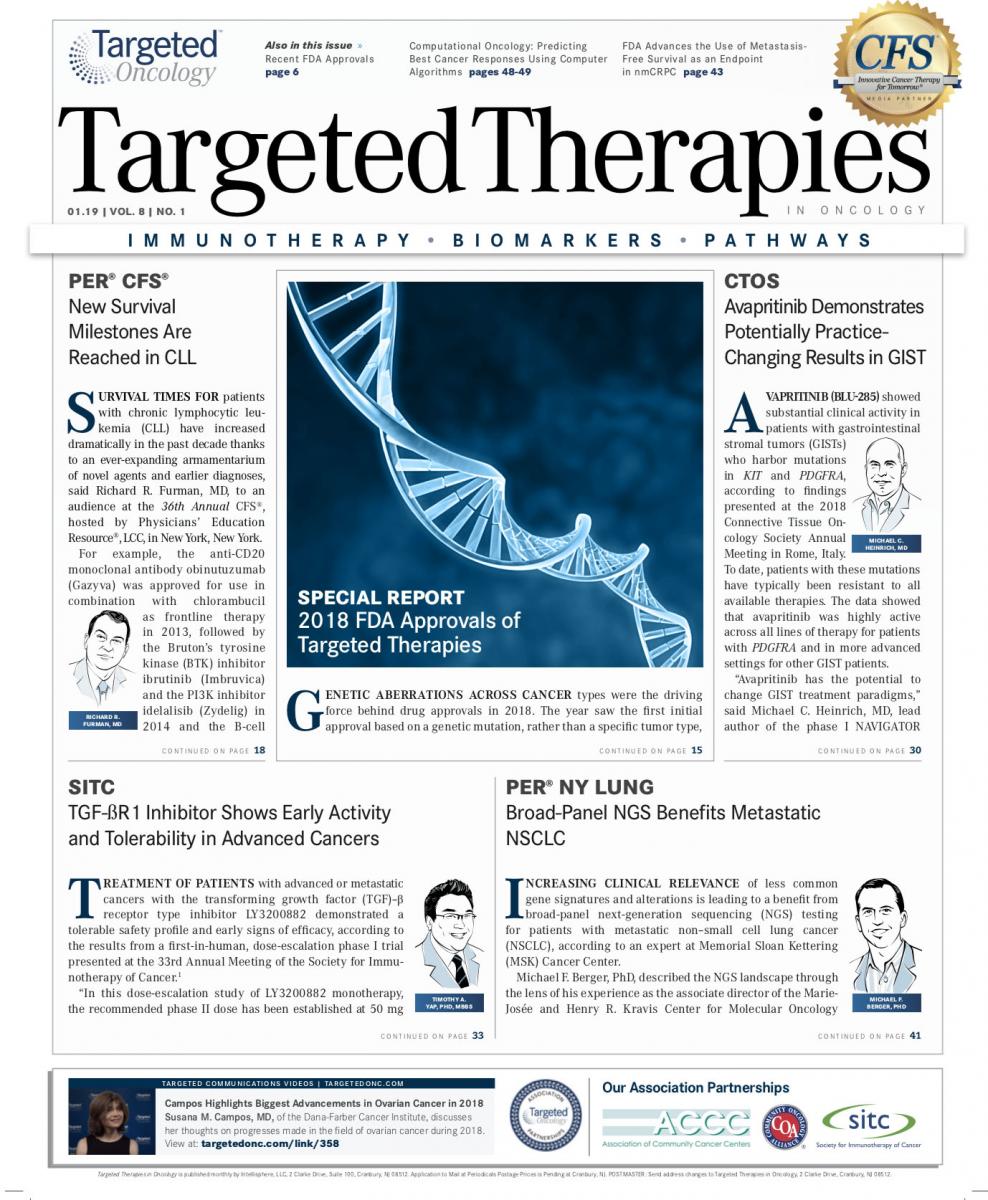FDA Advances the Use of Metastasis-Free Survival as an Endpoint in nmCRPC
In November 2018, the FDA issued a draft guidance recommending metastasis-free survival as an endpoint in drug trials for nonmetastatic castration-resistant prostate cancer, suggesting a major change in expectations for treatment of this tumor type.
James Mohler, MD
In November 2018, the FDA issued a draft guidance recommending metastasis-free survival (MFS) as an endpoint in drug trials for nonmetastatic castration-resistant prostate cancer (nmCRPC), suggesting a major change in expectations for treatment of this tumor type.
“Whereas radiographic progression-free survival has been standardized as an endpoint in metastatic settings, there was previously no earlier endpoint for nmCRPC trials. The FDA has now recognized that a prolonged delay in development of metastatic disease is an objective and clinically relevant measure,” officials from the FDA wrote in a perspective summary.1“Future agents may be approved on the basis of MFS only if substantial effects on this transition are demonstrated and the safety profile is acceptable for a medication taken long term.”
James Mohler, MD, associate director and senior vice president for Translational Research at Roswell Park Comprehensive Cancer Center in Buffalo, New York, described the FDA’s move as “a landmark change” considering the agency’s tendency to favor overall survival (OS) as an endpoint.
“There is great value in delaying the development of metastasis,” said Mohler in an interview withTargeted Therapies in Oncology. “I applaud the FDA for looking at an intermediate endpoint that is really meaningful for patients. This is a tremendous breakthrough.”
New Era of Treatment Dawns in 2018
Prior to the approval of apalutamide (Erleada), in February 2018, no therapies existed exclusively for the treatment of nmCRPC. As a result, many patients were unprotected against disease progression once androgen-deprivation therapy (ADT) had failed.
This approval was based on the results of the double-blind, phase III SPARTAN trial, in which MFS was used as the primary endpoint. Administration of apalutamide was associated with a median MFS of 40.5 months compared with 16.2 months in patients taking placebo, representing roughly a 2-year improvement (HR 0.28; 95% CI, 0.23-0.35;P<.001).2Participants (n = 1207) were randomized 2:1 to receive oral apalutamide at 240 mg daily or placebo in conjunction with ADT. High-risk, castration-resistant disease was defined as occuring with a PSA doubling time of 10 months or less during ADT.
Officials said the drug was “well-tolerated” and had similar incidence rates of serious adverse outcomes in the apalutamide and control groups.1They added that patient-reported outcomes showed “no notable adverse signals in symptom or functional effects despite the long treatment duration.”
In the interview, Mohler said too little attention has been paid to an important adverse event statistic in the study: the any-grade bone fracture rate of 11.7% in the apalutamide group compared with 6.5% in the placebo group.2Investigators on the apalutamide trial determined that “MFS has a significant association with OS and is predictive of OS in high-risk nmCRPC” and is therefore “a meaningful and valid intermediate clinical [endpoint] for OS.”3
Recognizing that the evolution from nmCRPC to metastatic disease is a clinically relevant event, the FDA Oncologic Drugs Advisory Committee (ODAC) discussed endpoints in therapies for nmCRPC in a 2011 meeting. Although they recommended that MFS could reasonably be used as an endpoint in clinical trials, they added that “ensuring clinical benefit of a drug would require a substantial magnitude of improvement and a favorable benefitrisk evaluation.”1
Another ODAC examined a randomized, placebo-controlled trial of denosumab in nmCRPC that reported an improvement of 4 months in bone-only MFS. ODAC members concluded that longer MFS would be required to justify an approval based on this endpoint.
Enzalutamide Enters the Picture for nmCRPC
Another option in nmCRPC came in July 2018 when the FDA granted enzalutamide (Xtandi) approval for a new indication after the phase III PROSPER trial in which 1401 patients were randomized 2:1 to oral enzalutamide at 160 mg or placebo once daily. All patients had been previously treated with ADT or bilateral orchiectomy. Median MFS was higher in the enzalutamide group than in the placebo cohort, at 36.6 and 14.7 months, respectively (HR 0.29; 95% CI, 0.24-0.35;P<.001).4
Enzalutamide was previously recommended for the treatment of patients with metastatic disease only. Meanwhile, dozens of trials are exploring the use of apalutamide and enzalutamide in conjunction with other forms of treatment such as medication and surgery.
FDA officials hypothesized that the use of MFS could require significant adjustment. They commented that “increasing sensitivity [of medical imaging] may increase the sensitivity and specificity of metastasis detection, potentially affecting the interpretation of study results and even changing the baseline characteristics of enrollees over time.”
Data about OS in apalutamide and enzalutamide are not yet available. “It will be interesting if apalutamide does not result in a change in OS,” Mohler said. “Even if OS does not differ, the value of delaying metastatic disease and its morbidity is probably worth use of the drug.”
Analyses of the drug’s long-term impact will need to consider its high cost, its adverse effects, and perhaps factors such as quality-adjusted life years gained, Mohler concluded.
References:
- Beaver JA, Kluetz PG, Padzur R. Metastasis-free survival a new endpoint in prostate cancer trials.N Engl J Med.2018;378(26):2458-2460. doi: 10.1056/NEJMp1805966.
- Smith MR, Saad F, Chowdhury S, et al; SPARTAN Investigators. Apalutamide treatment and metastasis-free survival in prostate cancer.N Engl J Med.2018;378(15):1408-1418. doi: 10.1056/NEJMoa1715546.
- Smith MR, Mehra M, Nair S, Lawson J, Small EJ. Association of metastasis-free survival (MFS) and overall survival (OS) in nonmetastatic castration-resistant prostate cancer (nmCRPC).J Clin Oncol.2018;36(suppl 15):5032. doi: 10.1200/JCO.2018.36.15_suppl.5032.
- Hussain M, Fizazi K, Saad F, et al. Enzalutamide in men with nonmetastatic, castration-resistant prostate cancer.N Engl J Med.2018;378(26):2465-2474. doi: 10.1056/NEJ- Moa1800536.

Savona Discusses First-Line JAK Inhibition for Patients With Myelofibrosis at Risk of Anemia
April 17th 2024During a Case-Based Roundtable® event, Michael Savona, MD, and participants discussed the case of a patient with myelofibrosis and moderate anemia receiving JAK inhibitor therapy.
Read More